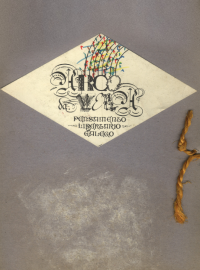Independence Anarchism is an ![]() anarchist,
anarchist, ![]() culturally left-wing and
culturally left-wing and ![]() economically left-wing movement of movements that emphasizes the
economically left-wing movement of movements that emphasizes the ![]() autonomy, self-determination or independence (national liberation) of a given people with a common identity from forms of hierarchy, especially centralized ones, in defense of the people's language and the non-
autonomy, self-determination or independence (national liberation) of a given people with a common identity from forms of hierarchy, especially centralized ones, in defense of the people's language and the non-![]() reactionary aspects of its culture and history. It inhabits the
reactionary aspects of its culture and history. It inhabits the ![]() bottom left corner of the political compass.
bottom left corner of the political compass.
Independence anarchism as a term originated in the stateless nations of Western Europe in the 80s, and was "officially" adopted by independence anarchists at their first international meeting in 1985, in Guasila, Sardinia. As a result, the movements from Western Europe are the only ones that use the label. A few examples of them are in ![]() Catalonia,
Catalonia, ![]() Brittany,
Brittany, ![]() Occitania, the
Occitania, the ![]() Basque Country, the
Basque Country, the ![]() Canary Islands,
Canary Islands, ![]() Sicily,
Sicily, ![]() Sardinia,
Sardinia, ![]() Andalusia,
Andalusia, ![]() Castile and
Castile and ![]() Galicia.
Galicia.
However, many similar ![]() national liberation movements in which
national liberation movements in which ![]() anarchists have participated have also existed in Eastern Europe, East Asia, the Americas and Northern Africa. These include
anarchists have participated have also existed in Eastern Europe, East Asia, the Americas and Northern Africa. These include ![]() Hong Kong,
Hong Kong, ![]() Korea, the
Korea, the ![]() Philippines,
Philippines, ![]() Georgia,
Georgia, ![]() Armenia,
Armenia, ![]() Puerto Rico,
Puerto Rico, ![]() Cuba,
Cuba, ![]() Kabylia (and
Kabylia (and ![]() Algeria in general), the
Algeria in general), the ![]() Rif (and
Rif (and ![]() Morocco in general),
Morocco in general), ![]() Macedonia (and
Macedonia (and ![]() Bulgaria in general),
Bulgaria in general), ![]() Bosnia and Herzegovina, and
Bosnia and Herzegovina, and ![]() Ukraine.
Ukraine.
Independence anarchism is seen as an ![]() anarchist tendency and a strain of Post-Colonial Anarchism alongside
anarchist tendency and a strain of Post-Colonial Anarchism alongside ![]() Indigenous Anarchism,
Indigenous Anarchism, ![]() Black Anarchism and Chicano Anarchism, all of which are involved in
Black Anarchism and Chicano Anarchism, all of which are involved in ![]() national liberation struggles. Ideologically, independence anarchism is compatible with both
national liberation struggles. Ideologically, independence anarchism is compatible with both ![]() social and
social and ![]() individualist forms of
individualist forms of ![]() anarchism.
anarchism.
History and Branches




 Catalan Countries
Catalan Countries 



The history of independence anarchism in the Catalan Countries (territories where the Catalan language is spoken) can be traced back to the 19th century. As the Catalan ![]() anarchist-oriented worker movement and the revindicative national liberation movement became ever so tied together, mostly due to their mutual belief in
anarchist-oriented worker movement and the revindicative national liberation movement became ever so tied together, mostly due to their mutual belief in ![]() federalism, ideals close to those of modern independence anarchism began to arise. By 1881, Josep Llunas i Pujals, the primary theorist of what would later become
federalism, ideals close to those of modern independence anarchism began to arise. By 1881, Josep Llunas i Pujals, the primary theorist of what would later become ![]() anarcho-syndicalism, founded the popular
anarcho-syndicalism, founded the popular ![]() libertarian collectivist weekly newspaper La Tramontana (The Tramontane), akin to
libertarian collectivist weekly newspaper La Tramontana (The Tramontane), akin to ![]() Catalanism and
Catalanism and ![]() federalism, while many
federalism, while many ![]() anarchist
anarchist ![]() Catalanists such as Jaume Brossa wrote essays on the magazine L'Avenç (The Advance), founded on the same year. Although L'Avenç and La Tramontana were closed by the authorities in 1893 and 1896 respectively, they would set the stage for other
Catalanists such as Jaume Brossa wrote essays on the magazine L'Avenç (The Advance), founded on the same year. Although L'Avenç and La Tramontana were closed by the authorities in 1893 and 1896 respectively, they would set the stage for other ![]() anarchist newspapers in Catalan to appear, such as L'Avenir (The Future) and El Progrés (The Progress), both in 1905. La Tramontana even shortly came back in 1903, 1907 and 1913.
anarchist newspapers in Catalan to appear, such as L'Avenir (The Future) and El Progrés (The Progress), both in 1905. La Tramontana even shortly came back in 1903, 1907 and 1913.
With the creation of the ![]() National Confederation of Labour (CNT) syndicate in 1910 in Barcelona, factions within
National Confederation of Labour (CNT) syndicate in 1910 in Barcelona, factions within ![]() anarcho-syndicalism that can be considered the precursors to Catalan independence anarchism began to materialize. Many prominent
anarcho-syndicalism that can be considered the precursors to Catalan independence anarchism began to materialize. Many prominent ![]() anarcho-syndicalists such as Joan Peiró, Salvador Seguí and Federica Montseny made statements in support of Catalan autonomy (despite the Statute of Autonomy of Catalonia being a subject that initially caused an internal division in the
anarcho-syndicalists such as Joan Peiró, Salvador Seguí and Federica Montseny made statements in support of Catalan autonomy (despite the Statute of Autonomy of Catalonia being a subject that initially caused an internal division in the ![]() CNT). Meanwhile, the
CNT). Meanwhile, the ![]() Iberian Anarchist Federation (FAI) was founded in 1927 in València.
Iberian Anarchist Federation (FAI) was founded in 1927 in València.

The ![]() CNT and the
CNT and the ![]() FAI briefly formed the CNT-FAI during the Spanish Civil War to prevent the
FAI briefly formed the CNT-FAI during the Spanish Civil War to prevent the ![]() nationalists from taking Catalonia. The CNT-FAI union still had its internal ruptures, which resulted in two main factions: the more moderate, minoritarian and
nationalists from taking Catalonia. The CNT-FAI union still had its internal ruptures, which resulted in two main factions: the more moderate, minoritarian and ![]() reformist Treintists that were mostly made up of some
reformist Treintists that were mostly made up of some ![]() CNT members, and the more majoritarian,
CNT members, and the more majoritarian, ![]() insurrectionary Faists led by the
insurrectionary Faists led by the ![]() FAI. Both sectors, despite the difference of their tactics, sometimes shared a
FAI. Both sectors, despite the difference of their tactics, sometimes shared a ![]() Catalanist sentiment although revindicative/nationalist rhetoric was nowhere to be seen. Before the CNT-FAI's social revolution fell apart, a proposal was made by the Valencian branch of the
Catalanist sentiment although revindicative/nationalist rhetoric was nowhere to be seen. Before the CNT-FAI's social revolution fell apart, a proposal was made by the Valencian branch of the ![]() CNT to make a Statute of Autonomy for the Valencian Country, but the project never saw the light of day. The
CNT to make a Statute of Autonomy for the Valencian Country, but the project never saw the light of day. The ![]() nationalists would take over all of Spain in 1939 and Franco would later have a lot of CNT-FAI members executed, effectively driving most Catalan anarchists into exile for the duration of the Francoist dictatorship.
nationalists would take over all of Spain in 1939 and Franco would later have a lot of CNT-FAI members executed, effectively driving most Catalan anarchists into exile for the duration of the Francoist dictatorship.
Throughout more recent history, the CGT was formed in 1979 as a result of a split in the ![]() CNT concerning union elections. The
CNT concerning union elections. The ![]() CNT, the CGT and the
CNT, the CGT and the ![]() FAI would continue to campaign for
FAI would continue to campaign for ![]() anarchism in Catalonia, frequently holding debates and talks about the "national question" between its members.
anarchism in Catalonia, frequently holding debates and talks about the "national question" between its members.
However, aside from these three main groups, independence anarchism would finally first appear after the Spanish transition to democracy, with the birth of self-described independence anarchist collectives exclusive to the Catalan Countries.
In Catalonia, these organizations would first appear in the 80's. The two most notable groups of the era were the Col·lectiu Ikària (Ikària Collective; CI) and the Federació Anarco-Comunista Catalana (Catalan Anarcho-Communist Federation; FACC).
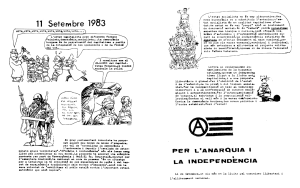
Ikària was born on January 1980 out of student movements and smaller independent libertarian organizations with the objective of initiating a debate inside the anarchist movement in Barcelona. After 1985 it became known as Ikària-Contracorrent, and it published the fanzineIkària: la Polla de Déu from January 1985 to March 1990. The FACC was founded in Barcelona in 1981 as an ![]() anarcho-communist organization for national liberation (after a long process started in 1978 by the
anarcho-communist organization for national liberation (after a long process started in 1978 by the ![]() anarcho-communist affinity group Tramuntana Floreal, now more commonly known as Nord-Est Llibertari), edited the bulletin Tramuntana (not to be confused with the original from 1881) and the newspaper Visca la Terra (Long Live the Land), and registered itself as a political party in 1983 under the name "Partido Federación Anarquista-Comunista Catalana".
anarcho-communist affinity group Tramuntana Floreal, now more commonly known as Nord-Est Llibertari), edited the bulletin Tramuntana (not to be confused with the original from 1881) and the newspaper Visca la Terra (Long Live the Land), and registered itself as a political party in 1983 under the name "Partido Federación Anarquista-Comunista Catalana".
The CI and the FACC worked together in the comarcal Libertarian Assembly of the Barcelonès, but nonetheless began to lose activity in 1982. Thus, on November 1982, they joined forces to create the Coordinadora Llibertària dels Països Catalans (Libertarian Coordinator of the Catalan Countries).
Aside from the CI and the FACC, the Libertarian Coordinator of the Catalan Countries regrouped several Libertarian Assemblies in different comarcas, such as that of the Empordà (including the Coordinadora Llibertària Empordanesa or Empordanese Libertarian Coordinator, which edited a publication called La Campana de l'Empordà (The Bell of the Empordà)), the Baix Camp (including the Col·lectiu Llibertari de Vilaplana (Libertarian Collective of Vilaplana)), the Maresme (and the Coordinadora Llibertària del Maresme or Libertarian Coordinator of the Maresme, which edited La Ceba (The Onion)) and the Berguedà, among others. There were also several smaller groups that followed independence anarchism inside the Coordinator, such as the Col·lectiu Independentista Estel Negre (Independentist Collective Black Star), the Grup Llibertari de l’Ateneu de Mataró (Libertarian Group of the Mataró Athenaeum), the Grup Anarquista l'Insurrecte (Anarchist Group 'the Insurgent'), the Aliança de la Democràcia Socialista (Alliance of Socialist Democracy) and even a youth organization called the Joventuts Anarco-Independentistes (Independence Anarchist Youth; JAI), which likely edited (along with the FACC) a fanzine in the city of L'Escala called Skena Pelat: fanzine llibertari de l'Empordà (Skena Pelat: libertarian fanzine of the Empordà).
After years of organizing activities nationally and internationally, the Libertarian Coordinator of the Catalan Countries became inactive by the mid 80's, but ultimately ceased to exist when the FACC was publicly dissolved in late 1988. The Ikària Collective suffered the same fate soon after their headquarters were attacked with an incendiary bomb on July 9th, 1990.
It is also important to note that a short-lived independence anarchist syndicate referred to as the National Confederation of Labour-Catalan Countries (CNT-PPCC) was formed on late 1983 as a result from a split that the CNT ![]() underwent. The CNT-PPCC is seen as another organizational proposal of the FACC.
underwent. The CNT-PPCC is seen as another organizational proposal of the FACC.
In the Valencian Country, nominally, independence anarchism would take a bit longer to arrive. Nevertheless, the collective Recerca Autònoma (Autonomous Research) was formed in 1993. It edited a magazine of the same name, first released on February 1994. Recerca Autònoma and other Valencian groups with similar tendencies such as Germania Socialista (Socialist Brotherhood) eventually fell into inactivity.
In spite of previous events though, independence anarchism in the Catalan Countries experienced a resurgence in the 2000's, with the creation of several new organizations. For example, local groups like Acció Autònoma (Autonomous Action), born in Terrassa in 1997, the collective Catarko, founded in the comarca of El Prat in 2006, and the Valencian collective L'Ullal (The Tusk), born in 2008.

But by far the largest independence anarchist collective in the Catalan Countries is Negres Tempestes (Black Storms; NNTT), founded in 2005 after many encounters between like-minded individuals in the annual Catalan protests of September 11th. Negres Tempestes edits the magazine La Rosa dels Vents (The Compass Rose) and focuses its activity on various squatted social centers, especially the Can Vies Self-Managed Social Center.
The Bloc Negre (Black Bloc) of the annual demonstrations on September 11th, National Day of Catalonia, serves as a yearly meeting point for the most recent Catalan independence anarchist groups.
TBD




 Brittany
Brittany 



TBA

 Occitania
Occitania 
TBA

 Basque Country
Basque Country 
TBA

 Canary Islands
Canary Islands 

TBA

 Sicily
Sicily 
TBA
 Sardinia
Sardinia 
TBA

 Andalusia
Andalusia 

TBA

 Castile
Castile 

TBA

 Galicia
Galicia 
TBA
Similar Movements
 Hong Kong
Hong Kong 
TBA
 Puerto Rico
Puerto Rico 
TBA
Personality
Very angry all the time, he just wants independence. (TBD)
How to Draw

The flag of independence anarchism is the anarchist version of the estelada (starred flag), an unofficial flag typically flown by supporters of Catalan independence. It was first notably used by the previously mentioned Catalan Anarcho-Communist Federation (FACC) in the 80's and later used by more recent groups from the 2000's onwards. Another version of the independence anarchist flag, mainly used by the Ikària collective (but first formulated by the FACC in November 1983), swapped the red 8-pointed star with a white circle-A symbol. Since then, many other variants have appeared (for example, one with a black field), especially recently, during the growth of the internet.
The symbolism behind the flag is as follows. The red stripes on the yellow background represent Catalonia or the Catalan Countries. The triangle symbolizes liberty, fraternity and equality, while the color black is the color of anarchy. The eight-pointed red star is a compass rose and, at the same time, represents the whole world and the 8 territories of the Catalan Countries (Catalonia proper, the Valencian Country, Andorra, the Balearic Islands, Northern Catalonia, La Franja, l'Alguer and el Carxe).
- Draw a ball.
- Fill in with yellow.
- Draw four horizontal red stripes.
- Draw a right-pointing, black triangle on the leftmost point.
- Draw an 8-pointed red star in the center of the triangle.
- Draw the eyes, and you're done!
| Color Name | HEX | RGB | |
|---|---|---|---|
| Yellow | #FFD800 | 255, 216, 0 | |
| Red | #CD0000 | 205, 0, 0 | |
| Black | #141414 | 20, 20, 20 | |
Relations
Friends
 Anarchism - You teached me to question the authority of the ruling nation-state.
Anarchism - You teached me to question the authority of the ruling nation-state. Post-Colonial Anarchism - We always support one another. I'd really like some of your more Americanized variants to recognize anti-imperialist struggles in Europe too though.
Post-Colonial Anarchism - We always support one another. I'd really like some of your more Americanized variants to recognize anti-imperialist struggles in Europe too though. Left-Wing Nationalism - I want my own autonomy. I don't want to be part of his
Left-Wing Nationalism - I want my own autonomy. I don't want to be part of his  clay anymore!
clay anymore! Anarcho-Syndicalism - Based parent that succeeded in Catalonia for some time.
Anarcho-Syndicalism - Based parent that succeeded in Catalonia for some time. Separatism - Our fight is for self-determination first and foremost!
Separatism - Our fight is for self-determination first and foremost! Black Anarchism - My black comrade. Keep fighting imperialism!
Black Anarchism - My black comrade. Keep fighting imperialism! Indigenous Anarchism - Resist statist colonial power structures!
Indigenous Anarchism - Resist statist colonial power structures! Democratic Confederalism - We miss you, Hogir...
Democratic Confederalism - We miss you, Hogir...
Frenemies
 Anationalism - Your idea of western internationalism does not acknowledge peoples' right to autonomy makes your ideology inconsistent with your anarchism, and is merely another form of imperialism. And I am a nationalist anarchist, and?
Anationalism - Your idea of western internationalism does not acknowledge peoples' right to autonomy makes your ideology inconsistent with your anarchism, and is merely another form of imperialism. And I am a nationalist anarchist, and? Esperanto is tolorable though. National Communism - Basically my authoritarian counterpart.
National Communism - Basically my authoritarian counterpart. Insurrectionary Anarchism - You need more organization!
Insurrectionary Anarchism - You need more organization!
Enemies
 Authoritarian Capitalism - Nightmare fuel at best.
Authoritarian Capitalism - Nightmare fuel at best. Imperialism - My worst enemy.
Imperialism - My worst enemy. Neoliberalism - I hate you
Neoliberalism - I hate you Francoism - You ruined Catalonia you horrible dictator!
Francoism - You ruined Catalonia you horrible dictator! National Anarchism - We could have been friends, but you're too hateful. I am an anarchist natcom, while he is an anarchist nazbol.
National Anarchism - We could have been friends, but you're too hateful. I am an anarchist natcom, while he is an anarchist nazbol.
Further Information
YouTube
- National Liberation & Anarchism by Saint Andrewism.
- A video about independence anarchism (In Spanish)
Wikipedia
 Independence Anarchism (English Wikipedia)
Independence Anarchism (English Wikipedia) Negres Tempestes (English Wikipedia)
Negres Tempestes (English Wikipedia) Anarchist-Communist Federation of Occitania (English Wikipedia)
Anarchist-Communist Federation of Occitania (English Wikipedia) Comandos Autónomos Anticapitalistas (English Wikipedia)
Comandos Autónomos Anticapitalistas (English Wikipedia) Pòble d'Òc (French Wikipedia)
Pòble d'Òc (French Wikipedia) Occitània Libertària (Occitan Wikipedia)
Occitània Libertària (Occitan Wikipedia) Askatasuna (magazine) (Spanish Wikipedia)
Askatasuna (magazine) (Spanish Wikipedia) Coordination Bretagne Indépendante et Libertaire (Breton Wikipedia)
Coordination Bretagne Indépendante et Libertaire (Breton Wikipedia) Le Huchoèr (Breton Wikipedia)
Le Huchoèr (Breton Wikipedia) Libertarian Collective Arco da Vella (Galician Wikipedia)
Libertarian Collective Arco da Vella (Galician Wikipedia) Arco da Vella (publication) (Galician Wikipedia)
Arco da Vella (publication) (Galician Wikipedia)
 Anarchism in Algeria (English Wikipedia)
Anarchism in Algeria (English Wikipedia) Anarchism in Armenia (English Wikipedia)
Anarchism in Armenia (English Wikipedia) Anarchism in Bosnia and Herzegovina (English Wikipedia)
Anarchism in Bosnia and Herzegovina (English Wikipedia) Anarchism in Bulgaria (English Wikipedia)
Anarchism in Bulgaria (English Wikipedia) Anarchism in Cuba (English Wikipedia)
Anarchism in Cuba (English Wikipedia) Anarchism in Georgia (English Wikipedia)
Anarchism in Georgia (English Wikipedia) Anarchism in Hong Kong (English Wikipedia)
Anarchism in Hong Kong (English Wikipedia) Anarchism in Korea (English Wikipedia)
Anarchism in Korea (English Wikipedia) Anarchism in Morocco (English Wikipedia)
Anarchism in Morocco (English Wikipedia) Anarchism in the Philippines (English Wikipedia)
Anarchism in the Philippines (English Wikipedia) Anarchism in Puerto Rico (English Wikipedia)
Anarchism in Puerto Rico (English Wikipedia)
People
People in bold are viewed as independence anarchists, people in bold and italics are viewed as predecessors to independence anarchism, and people in italics are mostly known for other reasons although they fit in one of the two previous categories.
 Cels Gomis (1841 – 1915)
Cels Gomis (1841 – 1915)  (Catalan Wikipedia)
(Catalan Wikipedia) Josep Llunas (1852 – 1905)
Josep Llunas (1852 – 1905) 
 (English Wikipedia)
(English Wikipedia) Eudald Canivell (1858 – 1928)
Eudald Canivell (1858 – 1928)  (Spanish Wikipedia)
(Spanish Wikipedia) Emili Guanyavents (1860 – 1941)
Emili Guanyavents (1860 – 1941)  (Catalan Wikipedia)
(Catalan Wikipedia) Pere Coromines (1870 – 1939)
Pere Coromines (1870 – 1939)  (English Wikipedia)
(English Wikipedia) Felip Cortiella (1871 – 1937)
Felip Cortiella (1871 – 1937)  (Catalan Wikipedia)
(Catalan Wikipedia) Jaume Brossa (1875 – 1919)
Jaume Brossa (1875 – 1919)  (Spanish Wikipedia)
(Spanish Wikipedia) Joan P. Fàbregas (1893 – 1966)
Joan P. Fàbregas (1893 – 1966)  (English Wikipedia)
(English Wikipedia) Joan Ferrer (1896 – 1978)
Joan Ferrer (1896 – 1978)  (Catalan Wikipedia)
(Catalan Wikipedia) Ricard de Vargas (c. 1950–)
Ricard de Vargas (c. 1950–)  (Spanish Wikipedia)
(Spanish Wikipedia) Jordi Martí (1969–)
Jordi Martí (1969–) 
 (Catalan Wikipedia)
(Catalan Wikipedia) Émile Masson (1869 – 1923)
Émile Masson (1869 – 1923)  (English Wikipedia)
(English Wikipedia) Kendal Breizh (1977 – 2018)
Kendal Breizh (1977 – 2018) 
 (French Wikipedia)
(French Wikipedia) Guy Malouvier (1938–)
Guy Malouvier (1938–)  (Le Maitron, in French)
(Le Maitron, in French) Joan Pau Verdier (1947 – 2020)
Joan Pau Verdier (1947 – 2020)  (English Wikipedia)
(English Wikipedia) Felix Likiniano (1909 – 1982)
Felix Likiniano (1909 – 1982)  (English Wikipedia)
(English Wikipedia) Marc Légasse (1918 – 1997)
Marc Légasse (1918 – 1997) 
 (French Wikipedia)
(French Wikipedia) Federico Krutwig (1921 – 1998)
Federico Krutwig (1921 – 1998)  (English Wikipedia)
(English Wikipedia) Pablo Sastre (1958–)
Pablo Sastre (1958–)  (Basque Wikipedia)
(Basque Wikipedia) Secundino Delgado (1867 – 1912)
Secundino Delgado (1867 – 1912)  (English Wikipedia)
(English Wikipedia) Alfredo Bonanno (1937–)
Alfredo Bonanno (1937–)  (English Wikipedia)
(English Wikipedia) Costantino Cavalleri (c. 1950–)
Costantino Cavalleri (c. 1950–)  (Italian Anarchopedia)
(Italian Anarchopedia) Chen Jiongming (1878 – 1933)
Chen Jiongming (1878 – 1933)  (English Wikipedia)
(English Wikipedia) Ramón Romero Rosa (1863 – 1907)
Ramón Romero Rosa (1863 – 1907)  (Encyclopedia.com)
(Encyclopedia.com) Santiago Iglesias (1872 – 1939)
Santiago Iglesias (1872 – 1939)  (English Wikipedia)
(English Wikipedia) Mohammed Saïl (1894 – 1953)
Mohammed Saïl (1894 – 1953)  (English Wikipedia)
(English Wikipedia) Kim Jwa-jin (1889 – 1930)
Kim Jwa-jin (1889 – 1930)  (English Wikipedia)
(English Wikipedia) Warlaam Tcherkesoff (1846 – 1925)
Warlaam Tcherkesoff (1846 – 1925)  (English Wikipedia)
(English Wikipedia) Hristo Botev (1848 – 1876)
Hristo Botev (1848 – 1876)  (English Wikipedia)
(English Wikipedia)
Online Communities
Literature
General
- Independence anarchism on EverybodyWiki. (In English)
- Federació Anarquista-Comunista Catalana on Enciclopèdia.cat. (In Catalan)
- Recopilación de textos sobre anarcoindependentismo (I parte) compiled by the Distribuidora Peligrosidad Social. Madrid, November 2011. (In Spanish)
- Recopilación de textos sobre anarcoindependentismo (II parte) compiled by the Distribuidora Peligrosidad Social. Madrid, February 2013. (In Spanish)
- Regard sur l'Anarcho-Indépendantisme by the Coordination of Anarchist Groups. Published in the former CGA website; October 9th, 2011. (In French)
- Catalogne : Du côté de la gauche sociale et indépendantiste by Martial. Published by the Commission Journal, originally in the Alternative Libertaire website (now the Libertarian Communist Union website); Saint Denis; November 20th, 2017. (In French)
- Anarcoindependentisme: Anarquisme independentista by Les Veus de Revolta. Published in the Les Veus de Revolta blog; Catalan Countries; September 21st, 2014. (In Catalan)
- Què és l’anarcoindependentisme? by Ezuri. Published in the Tramuntana blog; Catalan Countries; November 24th, 2017. (In Catalan)
- Tradición libertaria y luchas de liberación nacional compiled by Txolo Hedilla. March 9th, 2004. (In Spanish)
- Los clásicos anarquistas y los movimientos de liberación nacional (8th chapter of Anarquisme i alliberament nacional). Translated to Spanish by Trueno. (In Spanish)
- Le droit des peuples by Roland Breton. Published in the 6th issue of the Réfraction magazine, 2000. (In French)
- Libération nationale et émancipation sociale by Negus. Published in the 8th issue of the Confrontations magazine, March 1990. (In French)
- Anarchism, Reformism, and Struggles of National Liberation by the Barricada Collective. 2001 (?). (In English)
- À propos des luttes de libération nationale by the Organisation Communiste Libertaire. September 8th, 2009. (In French)
- La liberación de los pueblos: Una visión libertaria by "Cosimo Piovasco di Rondò". Published in the La Haine website; May 30th, 2009. (In Spanish and Catalan)
- Tesis sobre la liberación de los pueblos oprimidos by Félix Rodrigo Mora. Castile; January 2013. (In Spanish)
Catalan Countries
- Llibre Negre (3 volumes) by Jordi Martí i Font. Publishing houses Lo Diable Gros (Camp de Tarragona, Catalonia), Caliu (Benimaclet, València) and Calúmnia (Serra de Tramuntana, Mallorca); Tarragona; July 2018 (1st volume), February 2019 (2nd volume), November 2019 (3rd volume). (In Catalan)
- Visca la terra i visca l'anarquia by Jordi Martí i Font. Publishing house Calúmnia, Tarragona, June 2017. (In Catalan)
- Visca la terra i visca l'anarquia (2) by Jordi Martí i Font. Publishing house Calúmnia, Tarragona, September 2020. (In Catalan)
- Aproximació al col·lectiu anarcoindependentista Icària by Jordi Martí i Font. Tarragona, 2010. (In Catalan)
- Anarquisme i alliberament nacional by Ricard de Vargas Golarons, Joan A. Montesinos, Josep M. Canela, Joan Palomas, Joan Casares and Enric Cabra (Ikària Collective). Publishing house El Llamp, Barcelona, 1987. Re-edited by Negres Tempestes, Catarko and La Ciutat Invisible. Virus editorial, June 2007. (In Catalan)
- Por la independencia total y la anarquía sin límites by the Ikària Collective. Barcelona, 1988. (In Spanish)
- Independentismo y Anarquismo by the Ikària Collective. Barcelona (?), 1988 (?). (In Spanish)
- Xerrades internacionals anarcoindependentistes by the Ikària Collective. Publishing house La Polla de Déu, Barcelona, July 1990. (In Catalan)
- L'anarquisme no és una ideologia by Gerard Jacas (Catalan Anarcho-Communist Federation). Publishing house Tramuntana, Barcelona (?), 1985. (In Catalan)
- Recull de Textos Anarcoindependentistes compiled by Negres Tempestes. (In Catalan)
- Negres Tempestes Presentation by Negres Tempestes. Barcelona; June 17th, 2005. (In English)
- Per una república federal comunista llibertària dels Països Catalans by l'Autòpsia Social. València, 1989-1992. (In Catalan)
- País Valencià. La trista, trista història del meu país by Abraham Latorre i Rumbau. Published in the 5th issue of the 1st epoch of La Rosa Dels Vents, 2008. (In Catalan)
- Cap una xarxa de lluites independentista llibertària by the XLIL. October-November 1998. (In Catalan)
- Del jacobinisme anarquista antiestatista i de l'estatisme independentista by Josep M. Llauradó. Published in the Terreno Vedado blog; Tarragona; February 5th, 2011. (In Catalan)
- L'anarquisme, fet diferencial català by Xavier Diez i Rodríguez. Publishing house Virus, April 2013. (In Catalan)
- I jornades sobre anarquisme i qüestió nacional by CGT Catalunya. May 2002. (In Catalan)
- Orígens de l'anarcoindependentisme by Andreu Barnils i Carrera. Published in the Vilaweb news outlet; November 11th, 2018. (In Catalan)
- Una reflexió oberta sobre l'independentisme anarquista by IldeCiP. Camp de Túria; August 10th, 2020. (In Catalan)
- Catalanismo y anarquismo by Jaume Asens i Llodrà. Published in the Nohihadret blog; December 7th, 2012. (In Spanish)
- L'anarquisme i l'alliberament nacional / El anarquismo y la liberación nacional by Marcel·lí Reyes i Vidal. (In Catalan and Spanish)
- Independència en la lluita de classes by La Gatinada Negra. November 23rd, 2013. (In Catalan)
- Catalunya i les anarquistes by Ruymán Rodríguez. Published in the Solidaridad Obrera and Catalunya newspapers. (In Catalan)
- Declaració anarquista comunista revolucionària by Bakuninistes en Acció. November 2012. (In Catalan)
- 1-0: El poble i les seves gàbies. Publishing house Editorial Segadores, September 2017. (In Catalan)
- Nacionalismos, independentismos, anarquismo by Laia Vidal. Madrid; October 23rd, 2015. (In Spanish)
- Manifiesto por el No-Sí: ¡la revolución, sin Estado-nación, es la solución! by the Grup de Reflexió per a l'Autonomia. Catalonia, December 2013. (In Spanish)
- Some anarchist perspectives on Catalan Independence by Katy Brown. Published in the Nerve Magazine website; Catalonia; November 23rd, 2017. (In English)
Brittany
- Anarcoindependentismo en Bretaña / L'anarcho-indépendantisme en Bretagne by Gwelt@z. Published in the 10th issue of El Baifo. (In Spanish)
- Émile Masson (1869-1928): la genèse d'une pensée socialiste bretonne. Published in the 172nd issue of the Combat Breton magazine, April 2000. (In French)
- L'anarchisme et la liberté des peuples by Olivier François Le Clainche. Published in the 11th, 12th and 13th issues of Le Huchoèr; Brittany; 2004. (In French)
- Communisme libertaire et émancipation nationale by Per-Ewan. Published in the 11th issue of Le Huchoèr; Brittany; March 2004. (In French)
- Pour une Bretagne libertaire by Gwelt@z. Published in the 1st issue of Le Huchoèr; Brittany; April 2001. (In French)
- All texts published by the CBIL. (In French)
- Founding platform of the CBIL. (In English)
Occitania
- Occitània Libertària, qu'es aquò? by Occitània Libertària. (In French)
- The Peirigus Manifesto by the Occitan Anarchist-Communist Federation. (In Catalan)
- Schéma pour une révolution occitaine by Pòble d'Òc. Publishing house Salingardes; Saclas, France; Winter 1975. (In French)
- N'ayons pas peur des langues ! by JML. Toulouse; October 21st, 2001. (In French)
Basque Country
- Anark-Herria by Marc Légasse and Jakue Pascual. Publishing house Txertoa, Basque Country, 1986. Re-edited by Juantxo Estebaranz, Javi Olaizola, Ritxi Aizpuru, Idoia Eizmendi, Jordi Bonet i Martí and Jon Markel Ormazabal. Publishing houseTxalaparta, 2011. (In Spanish and Basque)
- El movimiento autónomo en Euskadi by Emilio López Adán (Beltza). (In Spanish)
- Apuntes sobre anarquismo y cuestión nacional by Jakue Pascual. Published in the Borroka Garaia da! website; Basque Country; November 28th, 2011. (In Spanish)
- Independentzia osoa / Independencia total by Anark-Herria. Basque Country, 2000's. (In Basque and Spanish)
- Anarquismo e izquierda abertzale by Borroka garaia da!. Published in the Borroka Garaia da! website; Basque Country; June 4th, 2015. (In Spanish)
- Aportación al debate sobre la izquierda abertzale by Jakue Pascual. Published in the Anark-Herria website; Donostia-San Sebastián; November 18th, 2011. (In Spanish)
- Marc Légasse: anarquista y separatista (interview with Marc Légasse). Published in the Punto y Hora de Euskal Herria magazine, Bermeo, September 1982. (In Spanish)
- Breve historia del anarquismo vasco by Juantxo Estebarantz. Publishing house Txertoa; June 17th, 2011. (In Spanish)
- Por una alternativa libertaria y global by Mikel Orrantia. Publishing house Zero Zyx; January 1st, 1978. (In Spanish)
- Nación y anarquismo: notas para una discusión más allá de las caricaturas by Manuel de la Tierra. Published in the Ekintza Zuzena magazine, Santiago de Chile, December 2010. (In Spanish)
- Euskadi: ETA y el nacionalismo revolucionario by Mikel Orrantia. Published in the Revista Mensual/Monthly Review, May 1979. (In Spanish)
- Cuestión nacional y autonomía obrera en Euskal Herria by Zirikatu. Biscay, 1985 (published in 1989). (In Spanish)
- Comandos Autónomos: un anticapitalismo iconoclasta by the Felix Likiniano Cultural Association. Publishing house Likiniano Elkartea, Bilbao, November 1996. (In Spanish)
- Komando Autonomoak: una historia anticapitalista by the Felix Likiniano Cultural Association. Publishing house Virus; Bilbao; December 17th, 1998. (In Basque and Spanish)
- Nazio arazoa by Bereterretxe. Publishing house Likiniano Elkartea, 1978. (In Basque)
- Telúrica vasca de liberación by Jakue Pascual. Publishing house Virus, November 1996. (In Spanish)
- El hilo negro de los noventa: encuentros con la autonomía by the Felix Likiniano Cultural Association. Publishing house Likiniano Elkartea, Bilbao. (In Spanish)
- La gran curva vasca del 2000 by Karlos García Salmones. Publishing house Likiniano Elkartea, c. 2000, Bilbao. (In Spanish)
- Palabras de un anarquista vasco by Marc Légasse. Publishing house Likiniano Elkartea; January 1st, 2002; Bilbao. (In Spanish)
- Felix Likiniano: miliciano de la utopía by Pilar Iparragirre. Publishing house Txalaparta; Tafalla; January 1st, 1994. (In Spanish)
- Marc Légasse: un rebelde burlón by Amaia Ereñaga. Publishing house Txalaparta; 1997. (In Spanish)
Canary Islands
- El libro negro del anarcoindependentismo canario - Canarias: Independencia y Autogestión [escritos anarcoindependentistas] compiled by Azarug. Canary Islands, August 2001. (In Spanish)
- Por qué un antimilitarista es también un nacionalista by the COA. Las Palmas de Gran Canaria, October 1984. (In Spanish)
- La CNT por la independencia de Canarias by Trueno. Published in the 5th issue of El Baifo, December 1991. (In Spanish)
- Necesidad de estructurar la CNT en Canarias by the COA. July 24th, 1992. (In Spanish)
- La independencia que queremos by Ferinto. Published in the 6th or 7th issue of El Baifo; September 1994. (In Spanish)
- Santa Cruz '94: Cinco siglos... ¡aguantándolos! by Manuel González. Published in the 6th or 7th issue of El Baifo; September 1994. (In Spanish)
- ¿Qué independencia? by Vicente Cañero. Published in the 8th or 9th issue of El Baifo; August 7th, 1995. (In Spanish)
- En Canarias también escribimos independencia con (A) by Ferinto. Published in the 220th issue of the CNT periodical, 1995. (In Spanish)
- La autodeterminación está de moda by the C.I. Anarko-Guanche. Published in the Alerta bulletin, December 1998. (In Spanish)
- Secundino Delgado y el anarquismo by El Pirácrata. 2001. (In Spanish)
- L'anarcho-indépendantisme aux Canaries / Anarcoindependentismo en Canarias by Vicente Cañero. Published in the 12th issue of Le Huchoèr, December 2003. (In French)
- Por la autoorganización de los anarcoindependentistas canarios by Vicente Cañero. August 2004. (In Spanish)
- Amo a mi país by Rayco. 2005. (In Spanish)
- Insumisión e Independencia by Alegato. 1992. (In Spanish)
- Federalismo libertario by CNT Canarias. Published in the 34th issue of the Bicicleta magazine, 1979-1980. (In Spanish)
- Antes que nacionalista, soy libertario: Secundino Delgado Rodríguez by 'Ω'. Published in the Sol Negro bulletin, Chayofa, June 2006. (In Spanish)
- Objetivos. Published in the Independencia y Autogestión en Canarias blog; April 13th, 2012. (In Spanish)
- Jornadas sobre Independencia y Autogestión: encuentros y desencuentros by CGT Tenerife, the ACRR and Azarug. La Orotava; April 13th, 2012 (held on April 28-29th). (In Spanish)
- Chronicle of the Jornadas sobre Independencia y Autogestión: encuentros y desencuentros by CGT Tenerife, the ACRR and Azarug. La Orotava; May 4th, 2012. (In Spanish)
- La patria de Secundino Delgado: sin capitalismo ni Estado by Josema González. Published in the the 9th issue of the 2nd epoch of La Rosa dels Vents, August 2014. (In Spanish)
Sicily
- Anarchism and the National Liberation Struggle by Alfredo Bonanno. Publishing house Bratach Dubh, Catania, 1976. Re-edited by Lucien van der Walt (in 1994, 2003 and February 2019). (In English)
- Un manifeste libertaire sicilien / Un manifesto libertario siciliano. Published in the Sicilia Libertaria journal. (In French)
- Sicilia: sottosviluppo e lotta di liberazione nazionale by Alfredo Bonanno. Publishing house Sicilia.L Edizioni, Catania, 1982. (In Italian)
Sardinia
- Lotta di liberazione nazionale: una prospettiva anarchica by Costantino Cavalleri. Published in the Anarkiviu bulletin, Sardinia, 2013. (In Italian)
- Sardennia contras a s'Istadu by Costantino Cavalleri. Published in the Anarkiviu bulletin, Sardinia, 1980's. (In Italian)
- Aux compagnons et compagnonnes du mouvement révolutionnaire sarde et international. Sardinia; July 19th, 2004. (In French)
- Compte-rendu de la première rencontre internationale anarcho-indépendantiste by Costantino Cavalleri. Published in Sardennia Contras a s'Istadu; Guasila; January 13th, 1986. (In French)
- Il richiamo nazionalista nelle lotte sociali by Canariah. Published in the 18th issue of the Canariah journal; Rome; October 4th, 2003. (In Italian)
- Sardegna: anarchismo e lotta di liberazione nazionale by Costantino Cavalleri. Publishing house Edizioni La Fiaccola, Ragusa, 1983. Re-edited by Costantino Cavalleri with the appendix Autodeterminazione come rivolta permanente. Contro l'autodeterminazione come diritto. Publishing house Arkiviu Bibrioteka "Tommasu Serra", Guasila. (In Italian)
Castile
- Una nueva herejía en el pensamiento libertario (o no tan nueva...) by El Lado Oscuro de Castilla. Madrid; October 15th, 2008. (In Spanish)
- Amigos del mundo uniformado, de los valores universales y del pensamiento etnocentrista by 'Wu Ming 1521'. Castile; January 6th, 2009. (In Spanish)
- Jornadas anarcoindependentistas y autónomas by Acción Castellana. Published in the Acción Castellana blog, Madrid, February 2008. (In Spanish)
Puerto Rico
- Reflexiones filosóficas sobre el anarquismo y las luchas nacionales en un país colonial by Damián Hernández Marrero. Puerto Rico; January 9th, 2012 (In Spanish)
Kabylia
- Un Kabyle, militant anarchiste des années 20-50 by Masin. Published in the Tamazgha magazine; Kabylia; February 6th, 2004. (In French)
Cuba
- Colonialism and Separatism (1865-1898) (1st chapter of Cuban anarchism: the history of a movement) by Frank Fernández. Publishing house See Sharp Press; Cuba; January 1st, 2001. (In English)
Russia
- Homeland and Nationality by Mikhail Bakunin. (In Spanish)
Ukraine
- A few words on the national question in the Ukraine by Nestor Makhno. Published in the 19th issue of the Dielo Truda magazine, Ukraine, December 1928. (In English)
Aragon
- El Consejo de Aragón by Alejandro García. Published in the Utopías y realidades blog; Aragon; February 22nd, 2008. (In Spanish)
Asturias
- Anarcoindependentismu: La facción más desconocida del movimientu llibertariu by Xulio Elipe Raposo. Published in Les Noticies, Oviedo, May 2008. (In Asturian)
Galicia
- Nacionalismo e Anarquismo - Materiais para o Diálogo by Treboada. Distributed by Cabuxa, Santiago de Compostela, 1992. (In Galician)
- Arredismo e Anarquia by Abordaxe!. Publishing house Ediçons Diáspora, Santiago de Compostela, April 2015. (In Galician)
- "Ni un solo rasguño" – Mi respuesta a los fanzines «Puñaladas al nacionalismo» by 'O Gajeiro Arredista'. Published in the COMOCHOCONTO blog; Galicia; March 22nd, 2018. (In Spanish)
Cantabria
- Anarquismo y nacionalismo by Agitación Rural. Published in the 2nd issue of the Agitación Rural fanzine, Cantabria, 2008. (In Spanish)
Levant
- El debate anarquista entorno a la liberación nacional by Wayne Price. Published in the Rebelión web portal; September 8th, 2006. (In Spanish)
Periodicals
Catalan Countries (1881 – 1913)
Catalan Countries (1949 – 1990)

![]() Terra Lliure (1949 – 1984)
Terra Lliure (1949 – 1984) ![]()
![]() (L'Argonnaute library, in French)
(L'Argonnaute library, in French)
Butlletí de la Regional Catalana C.N.T, Butlletí interior de l'Agrupació Catalana C.N.T..
Most issues can be found in the above link.

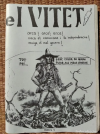
Arca! Arca! Arca! Visca el comunisme i la independència! Muiga el mal govern!.
- 1
- 2
- 3
- 4
- 5 (1979)
- 6
- 7
- 8 (1981)
- ?


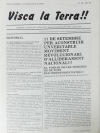
![]() Visca la Terra!! (1981 – 1986)
Visca la Terra!! (1981 – 1986) ![]()
![]()
Periòdic anarquista-comunista revolucionari de parla catalana.
- 1 (September 1981)
- 2 (September 11th, 1982)
- 3 (November 20th, 1982)
- 4 (December 1982)
- 5 (March 1983)
- 6 (April 1983)
- 7 (September 11th, 1983)
- 8 (March 15th, 1984)
- 9 (1984)
- 10 (September 11th, 1984)
- 11 (October 6th, 1984)
- 12 (Special issue; June 20th, 1985)
- 13 (July 6th, 1985)
- 14 (September 11th, 1985)
- 15 (October 1985)
- 16 (December 28th, 1985)
- 17 (January 11th, 1986)
- 18 (February 1986)
- 19 (March 1986)
- 20 (April 1986)
- 21 (May 1986)
- 22 (1986)
- 23 (September 11th, 1986)
- 24 (October 1st, 1987)
![]() Tramuntana butlletí (1982 – 1985?)
Tramuntana butlletí (1982 – 1985?) ![]()
![]()
No subtitle.
- 1 (November 1982)
- 2 (January-February 1983)
- 3 (November 1983)
- 4 (January 1984)
- 5 (March 1984)
- 6 (April 1984)
- 7 (May 1984)
- 8 (1984)
- 9 (Summer 1984)
- 10 (Spring 1985)
- 11 (Summer 1985)
- 1? (July 1986)

Full informatiu de la Coordinadora Llibertària del Maresme.
- 1 (1982) + independence anarchist manifesto
![]() La Campana de l'Empordà (1983)
La Campana de l'Empordà (1983) ![]()
Òrgan de la Coordinadora Llibertària Empordanesa.
- 0 (January-February 1983)
- 1 (March 1983)
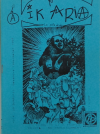
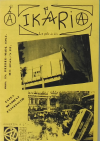


La polla de déu.
- 1 (Summer-September 1984)
- 2 (October-November 1984)
- 3 (January-February 1985)
- 4 (March-April 1985)
- 5 (May 1st, 1985)
- 6 (June-July 1985)
- 7 (August-September 1985)
- 8 (October 1985)
- 9 (1985)
- 10 (January 1986)
- 11 (February-March 1986)
- 12 (September 1986)
- 13 (1986)
- 14 (December 1986-January 1987)
- 15 (February-March 1987)
- 16 (September 1987)
- 17 (April 1988)
- 18 (May 1988)
- 19 (November-December 1988)
- 20 (May-June 1989)
- 21 (December 1989-January 1990)
- 22 (February-March 1990)
- Autodissolution document (September 1991)

Fanzine llibertari de l'Empordà.
- 1 (October 1986)
- 2 (1986)
- 3 (March-April 1987)
Catalan Countries (1994–)
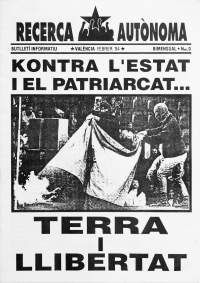
![]() Recerca Autònoma (1994 – 1998)
Recerca Autònoma (1994 – 1998) ![]()
Butlletí informatiu.
- 0 (February 1994)
- 1 (April 1994)
- 2 (June 1994)
- 3 (September 1994)
- 4 (December 1994)
- 5 (March 1995)
- 6 (June 1995)
- 7 (November 1995)
- 8 (May 1996)
- 9 (October 1996)
- 10 (March 1997)
- 11 (June 1997)
- 12 (December 1997)
- 13 (June 1998)
![]() Fulls de l'Autòpsia Social (1994)
Fulls de l'Autòpsia Social (1994) ![]()
Unknown subtitle.
- 1 (March 1994)
- 2 (May 1994)
- 3 (June 1994)
Revista d'agitació cultural.
- 1 (2004)
- 2 (Summer 2004)

![]() La Rosa dels Vents (2006–)
La Rosa dels Vents (2006–) ![]() (Own website, in Catalan)
(Own website, in Catalan)
Publicació de debat llibertari als Països Catalans.
- 1st epoch (April 2006 – April 2009)
- 2nd epoch (Q3, 2009 – Autumn 2014)
- 3rd epoch (February 2nd, 2019–)
Butlletí irregular dels Comitès Anarquistes dels PPCC.
- 1st epoch (Spring 2017 – September 11th, 2020)
- 1 (?)
- 2 (?)
- 3 (?)
- 2nd epoch (September 11th, 2020–)
- 4 (February 2022)
Brittany (1913 – 1997?)
Brittany (2001–)
Occitania

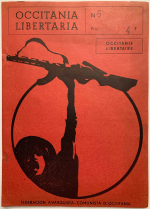
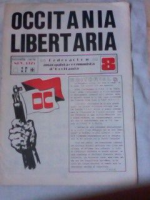
![]() Occitanie Libertaire/Occitània Libertària (1970 – 1975)
Occitanie Libertaire/Occitània Libertària (1970 – 1975) ![]()
![]()
![]()
Édité par la Fédération Anarchiste-Communiste d'Occitanie, Federacion Anarquista-Comunista d'Occitània.
- 1 (January 1970)
- 2 (1971)
- 3 (March 1972)
- 4 (1972)
- 5 (June 1973)
- 6 (1974)
- 7 (1975)
- 8 (November 1975)

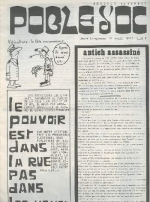
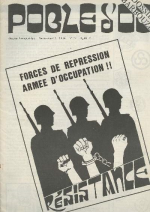
![]() Jeune Languedoc/Pòble d'Òc (1971? – 1985)
Jeune Languedoc/Pòble d'Òc (1971? – 1985) ![]()
![]()
Pòble d'Òc, Tribune révolutionnaire occitaine, Tribune révolutionaire pour une Occitanie libertaire.
- 1
- 2
- 3
- 4 (1971)
- 5
- 6 (June 1972)
- 7 (1972)
- 8 (September 15th, 1972)
- 9
- 10 (January 15th, 1973)
- 11 (March 11th, 1973)
- 12 (May 1st, 1973)
- 13 (1973)
- 14 (October 1st, 1973)
- 15
- 16 (February 1st, 1974)
- 17 (April 1st, 1974)
- 18 (July 1st, 1974)
- Supplement to the 18th issue "Pòble d'Òc répond aux 107 faux, mensonges, oublis, affabulations... de Lutte Occitane"
- Special issue 19/20
- 21
- 22 (March-April 1976)
- 23 (1976)
- 24
- 25/26 (1977)
- 27 (1977)
- 28 (1977)
- 29/30 (1978)
- 31 (1978)
- 32 (1978)
- 33 (1979)
- 34 (1979)
- 35 (October 1979)
- 36 (1980)
- 37 (Q2, 1980)
- 38 (1980)
- 39 (1981)
- 40 (1981)
- 41 (Autumn 1981)
- 42 (Q1, 1982)
- 43 (Q2, 1982)
- 44/45 (Q4, 1982)
- 46 (June 1983)
- Supplement to the 46th issue "Pòble d'Òc Dossier" (January 1985)
Basque Country


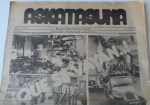

Revista teórica libertaria de Euskadi, Revista libertaria de Euskadi, Por la libertad contra la barbarie.
- 1st epoch (January 1971 – September 1978)
- 1 (January 1971)
- 2 (June 1972)
- 3 (October 1972)
- 4 (February 1973)
- 5 (June 1973)
- 6/7 (1974)
- 8 (May 1975)
- 9/10 (October 1975)
- 11 (January-February 1976)
- 12/13 (May-June 1976)
- 14/15 (November 1976)
- 16/17 (March-April 1977)
- 18 (October 1977)
- 19/20 (December 1977-January 1978)
- 21/22 (March-April 1978)
- 23 (May-June 1978)
- Special issue (September 1978)
- 2nd epoch (May 1979 – August 1980)
- 0 (May 1979)
- 1 (June 1979)
- 2 (July-August 1979)
- 3 (September-October 1979)
- 4 (October-November 1979)
- 5 (November-December 1979)
- 6 (January 1980)
- 7 (February 1980)
- 8 (March 1980)
- 9 (April 1980)
- 10 (May 1980)
- 11 (June 1980)
- 12/13 (July-August 1980)
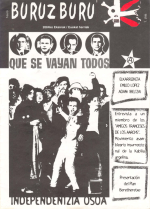
No subtitle.
![]() Aborijenen Internatzionala (2012–)
Aborijenen Internatzionala (2012–) ![]()
![]() (Own website, in Spanish)
(Own website, in Spanish)
No subtitle.
Canary Islands
Revista alternativa, Revista alternativa de las Islas Canarias.
- 1 (September-October 1987)
- 2 (May 1988)
- 3 (September 1988)
- 4 (February 1990)
- 5 (December 1991)
- 6-7 (September 1994)
- 8-9 (September-December 1996)
Fanzine libertario.
- 1 (1991?)
- 2 (1991?)
- 3 (1991?)
- 4 (1992?)
- 5 (1992?)
- ?
Fanzine de contrainformación y música alternativa elaborado en el valle de la Orotava, Tenerife, Islas Canarias.
- 1
- 2
- 3 (1992?)
- 4 (1992?)
- 5
- ?
No subtitle.
- 1 (April 1992)
- 2 (July 1992)
Sicily

![]() Sicilia Libertaria (1977–)
Sicilia Libertaria (1977–) ![]()
![]() (Own website, in Italian)
(Own website, in Italian)
Giornale anarchico, Giornale anarchico per la liberazione sociale e l'internazionalismo.
Most issues can be found in the above link.
Sardinia
![]() Sardegna libertaria (1978 – 1982)
Sardegna libertaria (1978 – 1982) ![]()
![]()
Bollettino di informazione anarchica, Mensile anarchico.
- Unique issue (1977)
- 1 (1977)
- Unique issue (1978)
- 2 (October 1978)
- 3 (November 1978)
- 4 (1979)
- Unique issue (January 1979)
- Unique issue (February-March 1979)
- Unique issue (May 1979)
- Unique issue (June 1979)
- Unnamed issue (April 1980)
- 5 (1980)
- 6 (1980)
- 7 (1981)
- 8 (1982)
![]() Sardennia contras a s'Istadu (1983 – 1987)
Sardennia contras a s'Istadu (1983 – 1987) ![]()
![]()
Periodicu indipendentista anarchicu iscrittu dae pastoris, procaxus e crabaxus , Jornalhi indipendentista anarkiku, Giornali libertariu po sa liberatzioni de su populo isfruttau e colonizzau sardu.
- 1st epoch (1983 – July 1984)
- 1 (Early 1983)
- 2 (1983)
- 3 (1983)
- 4 (1983)
- 5 (December 1983)
- 6 (1984)
- 7 (1984)
- 8 (June-July 1984)
- 2nd epoch (1985 – 1987)
- 1 (1985)
- 2 (April-May 1985?)
- 3 (1985)
- 4 (1986)
- 5 (1986)
- 6 (May-August 1986?)
- 7 (1986)
- ? (1987)
![]() Azione Anarchica/Azione Diretta (1986)
Azione Anarchica/Azione Diretta (1986) ![]()
![]()
Bollettino interno della Confederazione Internazionale Anarchica per la Liberazione … Nazionale.
- 1 (May 1986)
Fozu de su muimentu rivolutzionariu sardu.
- 1 (1990)
- 2 (1990?)
- 3 (1991?)
Asturias
Fueyes mecanografiaes baxo la responsabilidá de la « Comuña Llibertaria ».
- 1
- 2
- 3
- 4 (1983)
- 5
- 6 (1984)
- ?
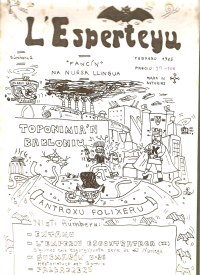
"Fancín" na nuesa llingua, Fancín n'asturianu, La prensa llibre d'Asturies.
- 0 (Late 1984)
- 1 (February 1985)
- 2 (March 1985)
- 3 (June 1985)
- 4 (December 1985)
- 5 (Early 1986)
- 6 (Mid-1986)
- 7 (November 1987)
- 8 (1988)
- 9 (December 1988)
- 10 (June 1989)
- 11 (December 1989)
- 12
- 13 (January 1993)
Galicia
Websites
Catalan Countries
- Negres Tempestes
- Tramuntana – d'Icària a Mallorca
- L'Ullal
- Comitès Anarquistes dels Països Catalans (CAPC)
- Grup de Reflexió per a l'Autonomia
- Independència Sense Límits
- L'AnarcoIndepe
- La Rosa Dels Vents (archived)
- Laketània webzine (archived)
Organizations not independence anarchist, with independence anarchist members or similarities:
- Embat - Organització Llibertària de Catalunya
- Federació Anarquista de Catalunya
- Federació d'Estudiants Anarquistes (archived)
Brittany
- Temps Noirs
- Breizh e Du
- Disuj ! (shop)
- Coordination Bretagne Indépendante et Libertaire (archived)
- Web Broadel (archived)
- Breizh Black Bloc (archived)
Occitania
Basque Country
- Anarkherria
- Libertad Free Askatasun
- Aborijenen Internatzionala
- Anarkiturri
- Rebeldía en Euskal Herria (archived)
Organizations not independence anarchist, with independence anarchist members or similarities:
Canary Islands
- Independencia y Autogestión en Canarias
- Guayota (archived)
- Dolor de Tormo (archived)
- Tanekra (archived)
- Vómito Rabioso (archived)
- Radikal Kanarias (archived)
Sicily
Organizations not independence anarchist, with independence anarchist members or similarities:
Sardinia
Andalusia
Castile
Hong Kong
Organizations not independence anarchist, with independence anarchist members or similarities:
Puerto Rico
Aragon
Asturias
Galicia
References
TBD
Gallery
| | |
| Main Related Self-Inserts | |
| Main Definitions Application Related Other Ideologies Self-Inserts | |
Self-Inserts | |
